×
SparkFun will be closed Nov. 28th and Nov. 29th in observance of Thanksgiving. Any orders qualifying for same day shipping placed after 2:00 p.m. MST on Wednesday, Nov 27th will be processed on Monday, Dec 1st. Wishing you a safe and happy holiday weekend from all of us at SparkFun!
SparkFun runs a sponsorship program that offers products and financial support to people who need a little help with their electronics projects around the world. We recently received a request from a center in New York that wanted to provide kits for their children's programs and, as a company highly invested in kids' electronics education, we wanted to know more about these kindred spirits. What we found were Dave VanEsselstyn and Jenny Young, the duo behind the Brooklyn Robot Foundry - an institution that offers classes, parties, clubs, programs and workshops on DIY electronics and tinkering for kids ages 4-12. We were blown away by the level of passion and dedication they have for their work, so we asked them some questions, and they were nice enough to oblige us around a busy schedule of young mind-molding.
What is the Robot Foundry all about, and how and when did it get started?
Jenny: We are two friends that joined forces to inspire and motivate kids by teaching them about the fun of building. We love the idea of learning and coming together through making things. We believe in the DIT — do it together — mentality and the importance of building a community around this common goal. We have backgrounds in mechanical engineering, software and educational psychology, and have both been working with our hands since we were children. We strive to make an environment that is educational, community based and most of all fun! We worked together for about four years at an educational software company. When I quit, we had lunch, and Dave pitched the idea of the Foundry. The idea really resonated with both of us because we grew up working with our dads in their garage workshops. And it is so hard for kids in the city to have that experience, due to space constraints. Our vision was to be the garage workshop for city kids. We started the company back in the spring of 2011, and we held our first class in Nov 2011 and did our first summer session last year.
Dave: I've been working in educational technology in various capacities for about 20 years, and I have consistently found that robotics really inspires and excites kids. I've daydreamed about opening up a space where kids could come and work on long-term robotics and electronics projects for a long time. At lunch one day, I raised the idea with Jenny, who is a mechanical engineer, and she got incredibly excited and said, "We've got to do that!" So we started really small, and it has continually gained energy over the last two years.
Can you tell us a little bit about your backgrounds and personal experiences with electronics and education?
Jenny: I grew up working with my father in the garage. He is the most mechanically-inclined person I have ever met; he can make or fix anything. It is really amazing! My mother is also very creative and always had us doing projects and learning about nature and science. My mother used to take us on "Magical Mystery Tours" (I didn't know until much later that it was a Beatles song), where we would go to really interesting places (arboretums, hikes in the woods, police department, fire station, boat rides, train rides, museums, glass factories, etc.) and learn and see new things. The way I was raised really helped create a sense of curiosity and wonder, and a quest for knowledge. We rarely watched tv, and we were always getting our hands dirty by touching, feeling and experiencing things.
I went to college to be a pilot but ended up switching into Mechanical Engineering. I think it was the desire to work with my hands, and I also really liked math. I loved college and I loved all of the incredible things I learned. I have always liked kids and starting in middle school I tutored kids in math. In college I volunteered as a CASA (a program where volunteers are appointed by judges to watch over and advocate for abused and neglected children to make sure they don't get lost in the legal and social service system). Other than that, I don't have any formalized background working in education, but Dave defintely does!
Dave: I have my Ph.D. in Human Cognition and Learning with an emphasis on Learning Technologies. I've always been interested in a wide variety of subjects, and I thought that educational technology would be a great career choice, as it would allow me to continue to study different disciplines while thinking about how technology could be used to best teach it.
In terms of electronics, I did a lot of work in the basement with my dad growing up - more woodworking than electronics, actually. I really came to appreciate his incredible ability to troubleshoot problems and come up with unique solutions and inventions. I think I later realized that the ways in which I go about solving problems and coming at the world has more to do with spending time with him at the workbench than any real formal educational experience, and I think that is one thing we've tried to emphasize at Brooklyn Robot Foundry. We set up experiences so that kids get exposure to how adult mentors and other kids come at solving problems.
What sort of programs do you offer, and to what age groups?
Jenny: We do birthday parties, weekend classes, after school classes, Girls' Club, all-day sessions (MLK day, Veteran’s day, etc.), mini camps (school breaks) and summer sessions. We also have a retail shop that sells cool, educational robot toys, gifts and t-shirts. We only sell toys that we believe in and feel are fun but also educational too. We currently hold classes for kids ages 4-12. Our goal is to provide more and more classes for older children, including up through high school. We aren't quite there yet but hope to be soon.
Dave: The emphasis with younger kids is on getting them excited to create, and we work up to soldering and projects like electronic books and fabrics with older kids. When starting off, it made the most sense to offer "one-off" classes that were about two hours, and a child could come to the class with no previous experience with electronics or robotics. This model allowed us to make sure that we enjoyed doing it, kids enjoyed doing it, and parents valued it.
While our model still includes these "one-off" classes, we are gradually moving toward more programs that have curriculum that builds over the course of multiple sessions. Examples of that include our "Robot Girls' Club," where girls come on Sunday nights and work with their dads or moms over a five-week period, and after-school classes where kids come for eight or nine weeks in a row. These extended interactions allow us to really allow kids to work independently with basic electronic and mechanical materials by the end, and come up with their own working designs - it is pretty incredible.
What materials do you use?
Jenny: Some of the robots we make are from kits, but a lot of them are made from found/recycled materials and electrical components (battery packs, LEDs, motors, etc). We are currently using this great little SparkFun motor in some of our projects.
Dave: We focus a lot on found materials. We love the STEAM (Science, Technology, Engineering, Art and Math) movement in education, and really find that when kids are given a bunch of pipe cleaners, cardboard, buttons and such, along with batteries, motors, and wheels, it really captures their imagination, and they come up with the most wonderful ideas. Our biggest problem is often getting kids to leave - we never have trouble getting them to engage.
We love the Bright Bunny Kit - and are in the middle of doing a project with that kit with our Sunday night Girls' Club! Also, seeing the incredible focus of kids at the Spark Fun booth at Maker Faire in San Francisco these last couple of years has been a great inspiration for us!
What are your future hopes for the Foundry?
Jenny: Ultimately we hope to open other branches. We also want to expand our age range even further and create some programs that are longer term, where we build bigger, cooler things. We strive to add in programs that are more project-based and collaborative (like designing a gardening robot). The idea for a project like the gardening robot is that it would be a multi-semester-long project where high school kids could work together to build and design portions of the system. Maybe we would start with designing the watering system, then designing the planting system, etc. I have a background in new product development and manufacturing, so we would love to bring that into the curriculum for older children. We also want to offer 3D CAD/printing courses and additional programming classes. Right now we offer a programming after-school (and summer) session using the Hummingbird Platform designed at Carnegie Melon. It has been a hit so far, but we want to expand that offering and potentially offer other classes with Arduinos, etc.
Dave: We are committed to iterating and getting everything right at our current location. We have learned so much these past couple of years, and are just now getting ready to launch some new activities - such as night time classes for adults, and increase our offerings around Arduino and Hummingbird Robotics. It has been hard for us to think/plan too far ahead, but at the core, we hope to continue to find ways to continue to be a resource for our local community in terms of high-quality science and engineering education activities and materials. Perhaps the community will grow beyond "local", but that is our emphasis at present.
What has been the most rewarding thing about the Foundry for you?
Jenny: I personally love watching how excited kids get when they learn a new skill, particularly one that they thought might be too hard for them. I believe that kids can do much more and create much more than people think. We teach a soldering class to 7 and 8-year-olds and they do so well! You have to make sure you have the right supervision but a child that age can really build and do things on their own. And then when they do, the look in their eyes is the most rewarding thing ever! I also enjoy showing girls that they can enjoy and love building. I was always told as a child that I could be whatever I wanted and I truly believe that is the case. Engineering is super fun, and helping little girls see that is a really wonderful thing. Teaching them that they can love princess outfits, ruffles, and flowers, and also love engineering, is a big thing. Engineers can come in every size, shape, and gender.
Dave: It has been a deeply creative enterprise - and is incredibly rewarding to act on a daydream. Working with Jenny has been an incredible treat - we share ideas very fluidly, and have worked really well at prioritizing ideas and executing the ones that seem most promising. I also have two daughters, and love that they have been able to get to know our amazingly creative, smart and warm staff. Building a community of makers has been a core desire for me in terms of this project, and moments where my kids are creating and interacting with others at the Foundry are certainly the most rewarding.
Photos courtesy of the Brooklyn Robot Foundry!
How have your students responded to curriculum that features electronics? Have there been any unforeseen issues or benefits when teaching with electronics?
Jenny: They love it! To create something on their own that lights up or moves is really thrilling. They get so excited to show their parents what they made! One of the things I have learned is that age isn't necessarily the best indicator of whether or not a child is ready for an activity. We have found that there are some extremely advanced 5-year-olds who could easily be in a class that we would typically aim at 8 to 10-year-olds.
Dave: I'd say they've responded remarkably enthusiastically. Many of the projects that they create have real personality, and the fact that electronics allow their creations to move around, I think, makes a real difference in terms of their interest in the work.
I honestly live for the moment when a student has spent 40 minutes attaching an axle to a baseplate, lining up a motor's worm gear with the axle, screwing on a motor cover, getting all the materials in place to make it move, and then finally putting in some batteries and turning it on. When they see their creation move, they fill up with such pride and excitement. I think it is really hard to reproduce that sort of visceral experience of excitement and understanding in more traditional educational environments, and I'm so fortunate to be able to direct those learning experiences at the Foundry.
Why do you believe using electronics in education is important, and what advice would you give other educators who want to use electronics in the classroom?
Jenny: Mostly I just think electronics are really fun. Once you show a child how easy it can be and give them a few simple skills, they can really build some very creative, fun things! I guess the other thing is that electronics are all around us. And part of what we like to do is demystify everyday items. We like to take things apart and show the kids what components are inside everyday items like cell phones, cordless drills, etc. We like to teach kids that things are not magical black boxes, and that there are things inside that we can understand and appreciate. I would tell educators that it isn't as hard as it sounds to integrate electronics into the classroom. We get a lot of adults who are intimidated by the types of projects that we work on. But I would tell educators that with a little bit of ramp up, they too can be helping kids get excited about robots and electronics.
Dave: I'm not sure that electronics is actually much more important than other curricular areas - but I do think it has some unique qualities that make it a compelling stratum upon which educational activities can be built. I think kids (and perhaps adults) are attracted to materials that are interactive and have qualities that surprise and delight them. Electronics lend themselves well to tinkering, problem solving and tweaking in a way that books do not. I'm not knocking books, of course, but hands-on, interactive experiences with electronics provide learners with a lot of fun and surprise. And they provide educators like myself with unique opportunities for structuring curriculum in ways that really engage students and get them excited to explore and learn more.
Thank you Dave and Jenny! We're always so happy to learn about places like the Foundry and people like you, and we wish you many happy years of success and excitement - keep up the awesome work!
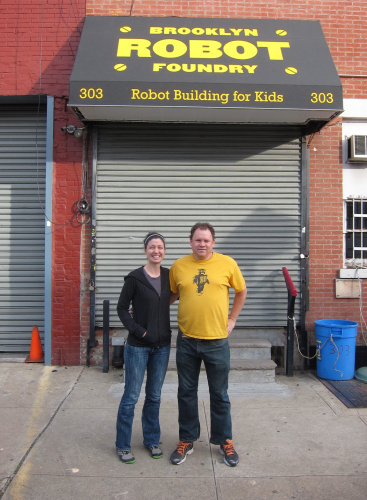
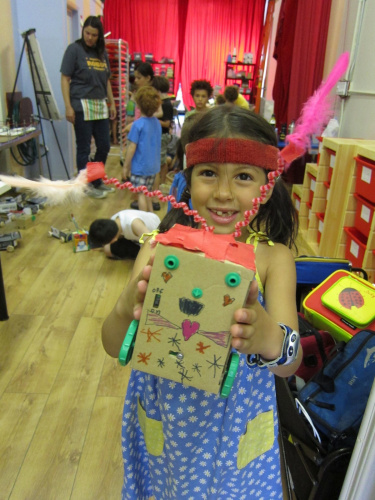
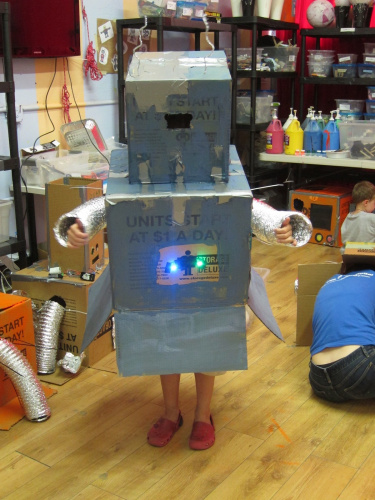
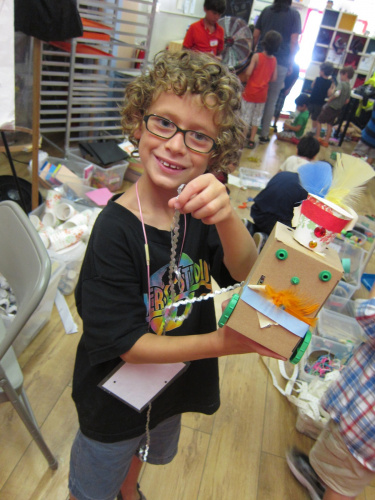



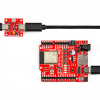


I am concerned about cuteness thresholds of this post. I may go around smiling waaaaay too much today. Bear with me.
They're charging over $100 a class and asking for sponsors? And now they are covering it up because you have to login to register and see the prices?
You might be surprised how expensive such as undertaking can be. Also, pricing can be found on this page: http://brooklynrobotfoundry.com/classes/
Brooklyn Robot Foundry rocks. I can not wait until my daughter is old enough to go. She can not wait either. She points at their magnet on our fridge and says go go go robot go. It is a great idea that I hope grows to reach many other areas.
I WOULD LOVE TO OPEN A BRANCH!